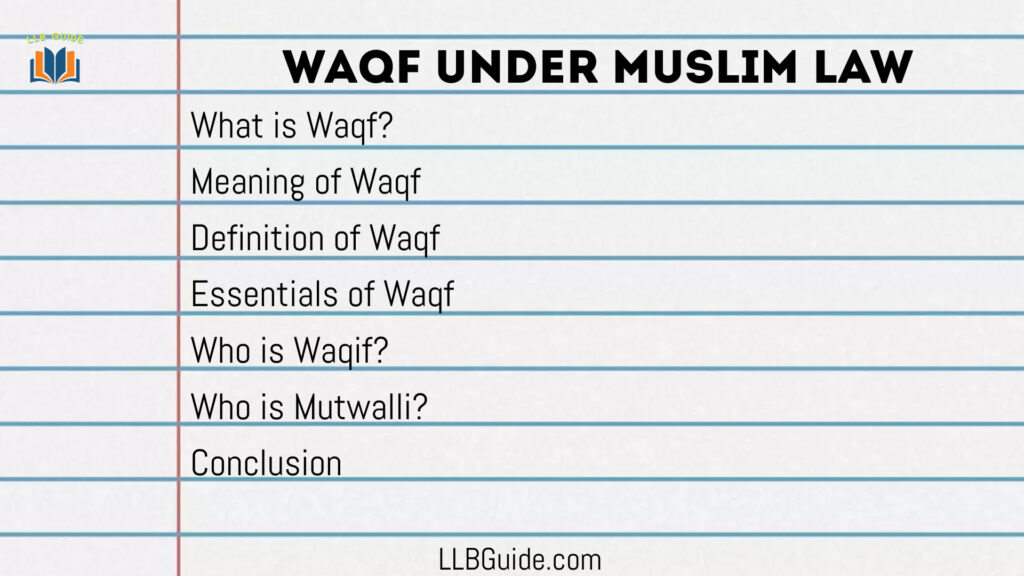The term Waqf under Muslim law is the dedication of any property for religious or charitable purposes. Waqf property can be movable or immovable, it is dedicated to the ownership of ALLAH ALMIGHTY. All benefits, resources, or profits gained from waqf property shall be used for the welfare of human beings.

Table of Contents
Concept of Waqf Under Muslim Law
The whole concept of wakf under Muslim law is explained below in detail.
What is Waqf?
Waqf in Islam is the dedication of any sort of property movable or immovable by any Muslim ‘male or female’ who is competent enough to make waqf. Waqf is always perpetual in nature and can not be revoked. Waqf is a voluntary transaction in which the Waqif (who dedicates his property) extinguishes his right to such waqf property in the name of ALLAH ALMIGHTY, and all the resources or profits by such property are used for the betterment of mankind. He can also appoint a Mutwalli or act himself as a Mutwalli. The waqf property can not be sold or given away once the waqf is made.

Meaning of Waqf
Waqf is an Arabic word that means ‘dedication‘. It is a ceremony in which something is dedicated to some goal or purpose (pious, religious).
Definition of Waqf
According to Imam Abu Hanifa R.A:
Waqf is the detention of a specific thing that is in the ownership of the waqif or appropriator, and the devotion of its profits or usufructs to charity, the poor, or other good objects, to accommodate loan.
According to Mussalman Wakf Validating Act, 1913:
The permanent dedication by a person professing the Mussalam faith of any property for any purpose recognized by Musalman Law as religious, pious, or charitable.
Essentials of Waqf
The following mentioned points are the essentials of waqf under muslim law.
1. Unconditional
Waqf must be clear and complete. Conditional waqf is void.
2. Irrevocable
Waqf in Islamic Law is always irrevocable.
3. Perpetual
Waqf must be infinite and permanent.
4. Inalienable
Waqf property is incapable of being repudiated or transferred to another.
5. Religious Purpose
Waqf under Islamic law must be made pious, religious, and charity.
6. Dedication to the Ownership of God
Waqf property must be dedicated in the name of ALLAH ALMIGHTY.
7. Extinguishment of the Right of Waqif
Waqif must extinguish his right in the waqf property, for the sake of waqf.
8. Benefit of Mankind
The purpose of waqf under Muslim law is always the benefit of mankind.
9. Subject Matter
The subject matter of waqf must be lawful. It can be:
- Movable
- Immovable
- Divisible
- Indivisible
10. Delivery of Possession
In waqf under Shia law, the delivery of possession is necessary.
Who is Waqif?
Waqif is a person who dedicates his property in the name of ALLAH ALMIGHTY. Waqif must be competent while making waqf.
Competency of Waqif
The Waqif must be:
- Muslim
- Adult
- Sound mind
- Owner of property.
Who is Mutwalli?
Mutwalli is a person who is appointed to ensure the fulfillment of essentials and the purpose of waqf. He acts as the manager of Waqf property.
Capacity of Mutwalli
The Mutwalli should be:
- Muslim or Non-Muslim
- Adult
- Sound mind
- Ability to act as Mutwalli.
Appointment of Mutwalli
The Mutwalli can be appointed by:
- Usage or Custom
- By executor (in the absence of usage or custom)
- By the Court.
Remuneration of Mutwalli
The remuneration of Mutwalli cannot exceed than one-tenth (1/10) of Waqf’s property. It can be:
- Written in Waqfnama
- Otherwise determined by the Court.
Powers of Mutwalli
The Mutwalli have such powers and duties as were mentioned in Waqfnama. The Mutwalli also exercises any powers which the Court authorizes him.
He can:
- Grant a lease of waqf property, more than 3 years if agricultural, not then 7 years if non-agricultural.
- Create a charge on the waqf property unless he is authorized to do so.
He can not:
- Incur a debt.
- Alienate the waqf property. (e.g sale or Gift it)
- Change the directions of Waqif.
Removal of Mutwalli
The Mutwalli can be removed on the following basis:
- Breach of trust
- Misfeasance
- Unfitness
Who can remove Mutwalli?
The Mutwalli can be removed by:
- Waqif
- Court
Conclusion
To conclude I can say that, Waqf in Islamic law refers to the dedication of any property for religious or charitable purposes. It can be movable or immovable, it is dedicated in the ownership of ALLAH ALMIGHTY. All benefits, resources, or profits gained from waqf shall be used for the welfare or betterment of human beings. It can not be revoked.
FAQs
What is the concept of waqf?
Waqf in Islamic law refers to the dedication of any property for religious or charitable purposes. It is dedicated to the ownership of ALLAH ALMIGHTY. All benefits or profits are used for the welfare of human beings.
What are waqf rules in Islam?
The Waqif must be Muslim, Adult, Sound mind, and Owner of property.
What is waqf in Pakistan?
Waqf in Pakistan is also governed through different administrations, it is the dedication of property in the name of ALLAH.
What are the characteristics of waqf in Islam?
The characteristics of waqf in Islam include unconditional, irrevocable, perpetual, inalienable, religious purpose, ownership in the name of ALLAH, extinguishment of right by waqif, and benefit of mankind.

